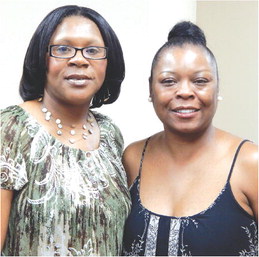‘ Where do you go?’

‘ Where do you go?’
2009 felony conviction jinxes local woman’s job search
news@theeveningtimes.com
Looking at Tomika Conway you would never know that she is a convicted felon.
She dresses well. She’s working on a master’s degree. She’s never done drugs. Doesn’t drink. Had no priors. She owns her own home. Her three children are well behaved and in school.
And yet, she can’t get a job.
All because of a 2009 conviction for theft of property. Although she still owes some money on her court fines, Conway has completed the terms of her probation and hasn’t been in any kind trouble with the law since.
But every time she goes for a job interview, a background check reveals that she is a convicted felon.
And her chances of getting a job evaporate because many employers won’t hire felons.
“We say we believe in second chances,” Conway said. “But where is it?
Show it to me. I don’t want anyone to do anything for me. Point me in the right direction and I will do the footwork.”
Conway was convicted in 2009 after she bought furniture from a neighbor which turned out to be stolen. She received five years of probation and when it was all over owed about $18,000 in fines and restitution.
“I didn’t know those people,” Conway said. “They were moving out as I was moving in. I had no priors. I had never been in trouble with the law before. I had never broken the law. I was on the straight and narrow and still am to this day. But somewhere along the line they just did not believe me.”
Conway cooperated with prosecutors but the felony conviction has turned her life upside-down.
Being a convicted felon has closed a lot of doors for her.
She has only been able to find factory work and has even been told that she is overqualified for McDonald’s.
Conway has a bachelor’s degree in health care administration with a concentration in human resources and is completing her master’s degree at University of Phoenix at the Cordova, Tennessee, campus.
She used to be an EMT and even completed nursing school but realized she didn’t want to be a nurse.
But all employers see when they conduct a background check is a felony charge.
“I have all these skills but when it comes out on the background check, all it shows is the charge,” Conway said. “You can’t even get a job though a temp agency because they require checks. I’m always up front. But it comes back to bite me.”
Conway landed an office job in Marion last week answering phones for $16 an hour plus benefits that was five minutes from her house and barely a minute away from her children’s school.
The woman who hired her was glad to have her. But when her background check showed she had a felony conviction, she lost the job.
“They were so excited about hiring me,” Conway said. “The lady said she was having trouble finding someone with the skills she was looking for. But, they have a policy about not hiring felons.”
According to the Bureau of Labor Statistics, only 12.5 percent of employers say they’d hire someone with a criminal record.
With that attitude from employers, ex-cons like Conway have a difficult time making a smooth transition back into every day life.
Studies show that when ex-felons are employed it decreases the chances of recidivism.
Most job applications, however, have a box to check if the applicant has been convicted of a crime.
Roughly nine in 10 employers in the United States check databases of criminal records when hiring for at least some positions.
“I’m beating down doors.
I’m going to job fairs. I’m up every morning, dressed in decent attire looking for work,” Conway said. “My motto used to be if I got the interview, I’ve already got the job. I was that confident.
I followed the rules. I
did my probation. The judge at one of my court appearances complimented me about how exemplary my efforts have been. But how on God’s green earth can you fulfill what you are obligated to do if no one will hire you? I mean, where do you go?”
Conway said she isn’t the only one having trouble.
Many times when she would visit her probation officer she would hear the same stories from frustrated ex-felons who were trying to get straight but had their probation revoked because they couldn’t find a job to pay off their fines.
Her own research showed that the recidivism rate for ex-felons was 34 percent in 2009. In 2015, it has jumped to 57 percent who can’t find employment and have been recycled through the system.
“I would hear them and they were so angry,” Conway said. “It is a very big problem with the way the system is set up.”
Conway is now on a crusade to get the law changed.
She’s contacted the Governor’s office and the local state legislators in Crittenden County, but to no avail. A “Ban the Box” campaign is gaining traction nationwide. Several states have already changed its laws to ban the question on job applications.
But the problem won’t be solved without a major shift in attitudes by employers.
“I have to tell myself in the mirror every day ‘you are not a criminal.’” Conway said. “You are not a criminal. Do not allow them to tell you who you are. I know the values I have. I know the morals that I have and what I want to be seen as. When I look at myself, I see progress.
But at times like these, I don’t see any movement.
I’m not looking for a hand out. I’m willing to work for anything.”
By Mark Randall


Share